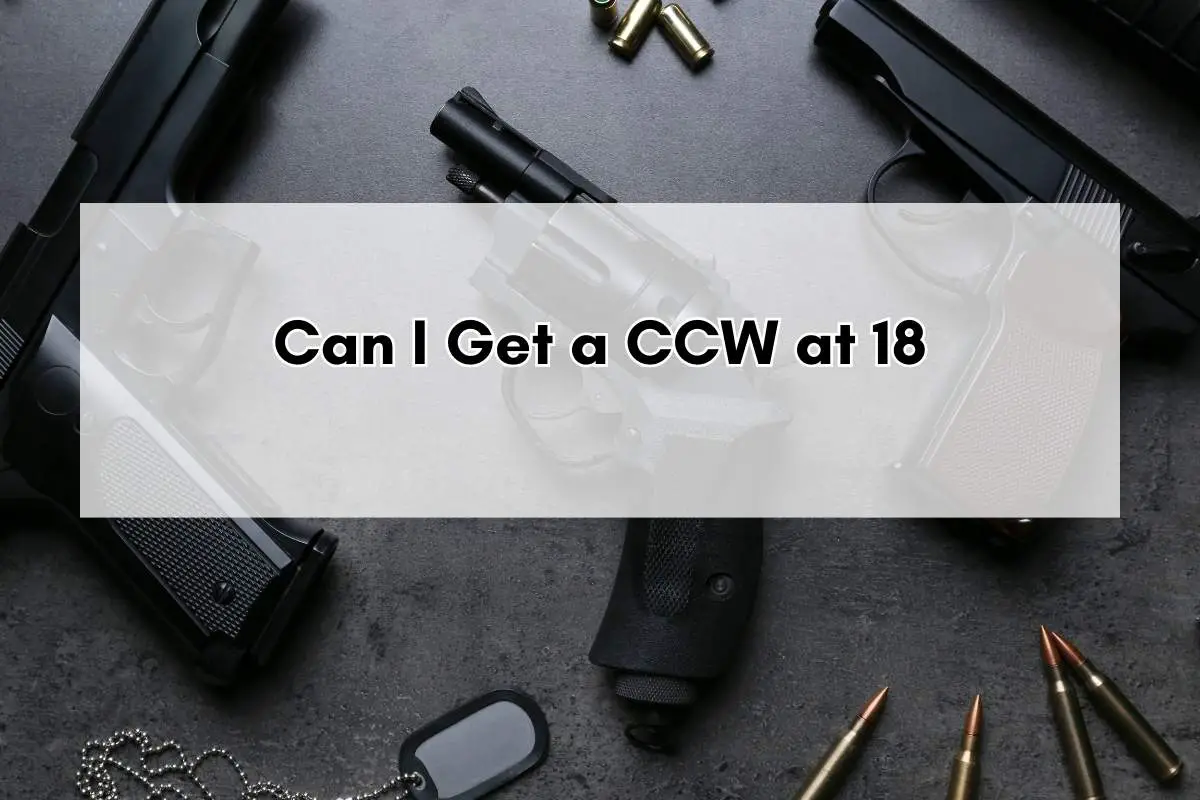Getting a concealed carry weapon (CCW) permit at 18 is possible in some states. The rules vary widely across the country. In states like Alaska, Arkansas, Idaho, and Maine, 18-year-olds can obtain a concealed carry permit.
Each state has its own laws about CCW permits. Some states require applicants to be 21 or older. Others allow 18-year-olds to apply. It’s important to check local laws before trying to get a permit.
For those under 21 who can get a CCW, there may be extra steps. Some states require more training for younger applicants. Others have stricter background checks. Always follow all state and federal laws when carrying a concealed weapon.
Key Takeaways
- CCW permit age requirements differ by state
- Some states allow 18-year-olds to get CCW permits, while others require applicants to be 21
- Following all laws and regulations is crucial when carrying a concealed weapon
Understanding CCW Laws
CCW laws vary across the United States. They set rules for who can carry concealed weapons and under what conditions. These laws impact gun owners of all ages, including those as young as 18.
Definition of CCW
CCW stands for Concealed Carry Weapon. It refers to the practice of carrying a hidden firearm in public. CCW laws regulate this activity.
A concealed weapon is one that is not visible to others. It can be a handgun, knife, or other weapon kept out of sight.
CCW permits allow people to legally carry concealed weapons. These permits have specific requirements that vary by state.
Federal vs State Regulations
The federal government sets some basic rules for gun ownership. But CCW laws are mostly decided by individual states.
Federal law sets the minimum age for buying handguns from licensed dealers at 21. However, it doesn’t set a minimum age for possessing or carrying handguns.
States have the power to make their own CCW laws. This leads to a patchwork of regulations across the country.
Some states have “constitutional carry” laws. These allow concealed carry without a permit for eligible adults.
Legal Age Requirements
The minimum age for CCW varies by state. Some states allow 18-year-olds to get CCW permits, while others set the age at 21.
States that allow CCW at 18 include:
- Alaska
- Arkansas
- Idaho
- Kansas
- Maine
- Missouri
Other states have stricter age limits. For example, Utah allows provisional permits at 18 but full permits at 21.
It’s crucial for young adults to check their state’s specific laws. Age requirements can change, so staying informed is important.
Eligibility Criteria at 18
Getting a concealed carry permit at 18 depends on state laws and specific requirements. Some states allow it, while others have stricter age limits.
State-Specific Minimum Age Laws
Many states set the minimum age for concealed carry at 21. But there are exceptions.
States that allow 18-year-olds to get permits include:
- Alaska
- Arkansas
- Idaho
- Kansas
- Maine
- Mississippi
- Missouri
- Montana
- New Hampshire
- South Dakota
- Vermont
- Wyoming
These states have laws permitting concealed carry at 18. Each state has its own rules and process for getting a permit.
Exceptions and Special Circumstances
Some states have unique rules for 18-year-olds wanting to carry concealed weapons.
Utah allows 18-year-olds to get a provisional concealed handgun permit. This is different from a regular permit.
Vermont lets people carry concealed at 16. But federal law says you must be 18 to buy a handgun.
Military service can affect eligibility. Some states make exceptions for active duty or veteran status.
Local laws may add extra rules. Cities or counties might have stricter age limits than state law.
Application Process for 18-Year-Olds
Getting a concealed carry permit at 18 requires careful attention to state laws and regulations. The process involves specific documentation, training, and background checks.
Documentation and Identification
Applicants must provide proof of age and residency. A valid government-issued photo ID is essential. This can be a driver’s license or state ID card. Some states may require additional documents like birth certificates or passports.
Proof of citizenship or legal residency status is often needed. This can be a birth certificate, naturalization papers, or green card.
A completed application form is required. Forms can usually be found online or at local law enforcement offices. Applicants should fill out all sections accurately and completely.
Some states ask for character references. These are typically non-family members who can vouch for the applicant’s character and fitness to carry a concealed weapon.
Mandatory Training and Education
Most states require completion of a firearms training course for concealed carry applicants. These courses cover gun safety, laws, and proper handling techniques.
Course length varies by state. It can range from a few hours to several days. Some states specify a minimum number of training hours.
Hands-on range training is often part of the course. This involves demonstrating proficiency with a firearm. Applicants may need to pass a shooting test.
Some states require knowledge of state and federal gun laws. This may be covered in the training course or require separate study.
Background Checks and Waiting Periods
All applicants undergo a background check. This checks for criminal history, mental health issues, and other disqualifying factors.
The process often includes fingerprinting. Local law enforcement or authorized fingerprinting services usually handle this.
Some states have a waiting period after application submission. This can range from a few days to several weeks. During this time, authorities review the application and conduct background checks.
Applicants with a clean record may be approved faster. Those with any issues in their background may face longer wait times or additional scrutiny.
Carrying Concealed Weapons on College Campuses
Laws about carrying concealed weapons on college campuses vary widely across the United States. Some states allow it, while others prohibit it. Individual schools also have different policies on the matter.
State Policies on Campus Carry
As of 2023, 12 states allow concealed carry on public college campuses. These states have passed laws permitting firearms on campus grounds.
19 states ban concealed weapons on college campuses. In these states, it’s illegal to bring firearms onto campus property.
The remaining 19 states let colleges decide their own policies. Schools in these states can choose to allow or prohibit concealed carry.
Some states have special rules. For example, Arkansas allows enhanced CCW permits for campus carry. This requires extra training and testing.
Institutions’ Stance on CCW
Even in states that allow campus carry, many colleges restrict where guns are permitted. Common restricted areas include:
- Dorms
- Classrooms
- Athletic events
- Laboratories
Schools may limit who can carry concealed weapons. Often, only faculty and staff are allowed to carry. Some schools require special permission.
Many colleges that allow campus carry still discourage it. They may offer gun storage facilities as an alternative to carrying on campus.
Private colleges can set their own rules about firearms on campus. Most choose to ban concealed carry, even in states that allow it at public schools.
Military Personnel Exceptions
Active duty military members often have special considerations for concealed carry permits. These exceptions can include lower age requirements and broader reciprocity across states.
Relaxed Age Restrictions for Service Members
Some states allow active duty military personnel to obtain concealed carry permits at age 18. This is an exception to the usual minimum age of 21 for civilians. For example, Ohio lets active servicemen and servicewomen purchase firearms before age 21. Nevada has similar provisions.
These exceptions recognize the firearms training military members receive. Most service members undergo extensive weapons training as part of their duties. This experience can qualify them for CCW permits at a younger age than civilians.
States may require additional training beyond standard military instruction. Military members should check their state’s specific requirements. Some bases also allow concealed carry for qualified personnel, but rules vary by location.
CCW Reciprocity for Military Members
Military personnel often move between states due to reassignments. This can complicate concealed carry permit validity. To address this, many states offer special reciprocity for military CCW holders.
Some states make exceptions to residency requirements for active duty military. This allows service members to obtain permits in their stationed state, even if they’re not permanent residents.
Several states also offer expedited permit processes for military members. These streamlined procedures recognize their service and unique living situations. Florida, for instance, expedites concealed carry permit applications for veterans.
Military members should research reciprocity agreements between states. This helps ensure their permits remain valid when traveling or relocating for duty.
Consequences of Non-Compliance
Breaking concealed carry laws can lead to serious legal trouble. Penalties may include fines, jail time, and loss of gun rights. It’s crucial to understand and follow all relevant laws.
Legal Penalties
Carrying a concealed weapon without a proper permit is often a criminal offense. Penalties vary by state but can be severe. In some areas, it’s a misdemeanor with fines up to $1,000 and up to one year in jail. Other states treat it as a felony.
Felony charges can result in:
- Prison sentences of 1-5 years or more
- Fines of $5,000-$10,000
- A permanent criminal record
Repeat offenses typically lead to harsher punishments. Some states impose mandatory minimum sentences for illegal concealed carry.
Impact on Future Firearm Rights
A conviction for illegal concealed carry can have long-lasting effects on gun rights. Many states revoke firearm licenses after such convictions. Federal law prohibits felons from owning firearms.
Other potential consequences include:
- Difficulty obtaining future concealed carry permits
- Loss of hunting licenses
- Restrictions on purchasing firearms
Some convictions may be eligible for expungement. This can restore gun rights in certain cases. However, the process is often lengthy and expensive.
Employment opportunities may also be limited. Many jobs that require firearms are off-limits to those with gun-related convictions.
Frequently Asked Questions
California has specific laws and procedures for concealed carry permits. The requirements, application process, and restrictions vary from other states.
What are the eligibility requirements for obtaining a CCW permit in California?
Applicants must be at least 21 years old to get a concealed carry permit in California. They need to pass a background check and demonstrate good moral character.
Residents must also show a valid reason for needing a concealed carry permit, such as a specific threat to their safety.
What is the application process for a concealed carry permit in California?
The process begins with submitting an application to the local sheriff’s office or police department. Applicants must provide personal information, fingerprints, and proof of residency.
They also need to complete a firearms safety course and pass a written test. The licensing authority will then review the application and conduct an interview.
Are there restrictions on where a CCW permit holder can carry their concealed weapon in California?
Yes, California has several restricted areas. CCW holders cannot carry in schools, government buildings, or airports.
Some private businesses may also prohibit concealed carry on their premises. It’s important for permit holders to know and follow these restrictions.
What training is necessary to apply for a CCW in California?
California requires applicants to complete a firearms safety course. This course covers gun laws, safety practices, and proper handling of firearms.
The training typically includes both classroom instruction and hands-on practice at a shooting range.
Is it possible to obtain a concealed carry permit online in California?
No, California does not offer online applications for concealed carry permits. The process requires in-person steps like fingerprinting and interviews.
Applicants must apply through their local law enforcement agency. Some initial forms may be available online, but the full process cannot be completed remotely.
How does California’s concealed carry permit differ from other states?
California has stricter requirements compared to many other states. It is a “may-issue” state, meaning local authorities have discretion in approving permits.
Unlike some states, California does not allow concealed carry for 18-year-olds. The state also requires applicants to show “good cause” for needing a permit.

